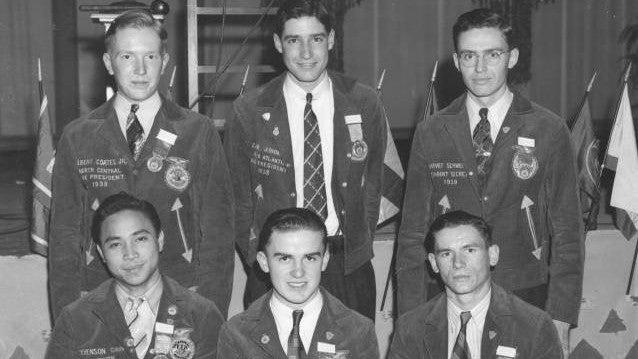
Stevenson Ching
Born in 1918 on the Hawaiian island of Kauai, the late Stevenson Ching (pictured above, first row, far left) cultivated in FFA a passion for agriculture that flourished throughout his life.
Ching was a member of the Hans P. Faye FFA Chapter that began in 1935, which is when he started his freshman year at Waimea High School. He served as chapter president in 1936, and in 1937, he was elected president of the Hawaii FFA Association.
In 1938, Ching was named his chapter’s “outstanding senior farmer” and appointed chapter president for the following year (a repeat), but his most exciting news was yet to come.
At the age of 19, Ching made history when he was elected the 1938-39 national FFA vice president at the 11th National FFA Convention in Kansas City, Mo.
He was the first national officer of color and he remains the only FFA member from Hawaii to serve as a national officer.
That was just the beginning of Ching’s impressive career in agriculture. He and his brothers operated a nearly 200-acre ranch on Kauai that included cattle, horses, swine and chickens. In 1946, he became an egg grader and served as an inspector for the Hawaii Board of Agriculture and Forestry.
Ching went on to work for the Hawaii Department of Agriculture (HDOA), initially as chief of the marketing and economics branch, and later as chief of the commodities branch. After retiring from the HDOA, he established a commercial orchid-growing business called S&K Orchids.
An Inspiration
Ching passed away in 2006 at the age of 87. His legacy endures, however, and still inspires FFA members today.
Not only did he embody the hard work, service and dedication that FFA imparts, but he also was a visionary who supported the organization’s commitment to constant improvement — as well as the patience and perseverance required to see it through.
“Let us resolve to better our organization, just as the great patriots, pilgrims and pioneers have built America,” Ching said in his vice president’s report at the 12th National FFA Convention in 1939. Then, reflecting the famous words of American icon Helen Keller, he said, “We have plenty to do, so let us not shirk. It is well to remember the world is moved not only by the shoves of the mighty heroes, but also by the aggregate of the tiny pushes of each little honest worker.”











